-
About Us
Canal Boatmen Family History
Boatmen in the news
Newspapers -Staffordshire
More from Staffordshire
Newspapers - Warwickshire
Newspapers - Birmingham
Newspapers - Leicestershire
Newspapers - Derbyshire
Newspapers - Nottingham
Newspapers - Cheshire
More from Cheshire
Newspapers - Northants
Newspapers - Lancashire
Newspapers - Manchester
Newspapers - Liverpool
Newspapers - Yorkshire
Newspapers - Worcestershire
Newspapers - Gloucestershire
Newspapers - Shropshire
Newspapers - Oxfordshire
Newspapers - Wales
Newspapers - Essex
Newspapers - Kent
Newspapers - London
Censuses
Parish register extracts
Other useful stuff
Contacts, names and photos
Contact
Links
Researching canal boat ancestors
Genealogy is a bit of a passion of mine (understatement!). I knew before I started researching my family tree that my mother's family had worked on the canal boats for many generations. What I hadn't appreciated was the difficulties in tracing canal boat ancestors. I'm not pretending to be an expert in these matters, but I'm hoping that some of the lessons I've learned in tracing my own family tree may help others to do the same. Please let me know if you find this useful, and also any other resources you may know of, or wish existed.
I'm afraid you may have to be patient with me while I put this section of the website together, as there is a great deal of material I need to process. Keep popping back and see what's new!

Please take a look at the list of useful websites on the links page at the end of the site, which details some of the online resources which I've found particularly useful, and some which I've come across in the course of my own research which, whilst they have not been particularly useful for my own family tree, give details of boatmen ancestors in other areas of the country.
So here's a start. A potted history!
If you call up a document on the site, another box will appear in the top left hand corner of the screen alongside the main site address. If you click on the x in the corner of the box when you have read the document, it will return you to the main page.

In the early days of the canals, boatmen were relatively well paid in the scheme of things. At the earliest census in 1841, most boat families lived in a house, so that even if the husband was away working on the canals, the wife and children were living on land. One of my boat families, the Hinmans, lived in Knowle, Warwickshire in 1841. In 1825, Edward Hinman married Mary Reynolds at Hampden-in -Arden, and in 1841 Mary and her younger children are in Knowle, though Edward is not.

By the mid 1840's, however, the situation had changed. The advent of the railways as an alternative for freight carrying made transport by barge less popular, and hence work on the canals became less lucrative. Families could no longer afford to maintain a house on land, and were forced to live in the boats, which could not have been easy, given the limited space available in the boat cabins. This had a double effect financially - not only was there no rental charge for a house, but the women also worked the boats alongide the men, thereby reducing labour costs. Canal Barge work was one of the occupations which was truly non discriminatory! The fact that "our floating population" was now itinerant creates difficulties in finding them in the censuses.
If a boat was moored, then its occupants might have been counted, if the census taker did his job properly, but if a boat was on the move at the time of the census, the likelihood of the family and crew being counted is very low indeed. If you are lucky then your boat family might have been counted once in the thirty years between 1851 and 1881.
On this occasion in 1851 the census taker in Bushbury "went the extra mile" and recorded not only the boatmen moored up in their boats, but a family of hawkers sleeping in a cart on the Turnpike Road. For this I am very grateful, as both of these families - the Hinmans and the Salts - appear in my family tree.
The article here is from the Manchester Times and is dated January 10th 1852. Entitled "Railway Festivity", it details a get-together of railway employees, and extols the wonders of railways as a mode of transport, as well as giving some pretty insulting views on canal transport and boatmen.

In addition to their absence from the census records, it was not compulsory to register the births of children, and many boat families did not bother to do so. As stated in some of the later articles, many boatmen and women did not bother with a formal marriage either. The only part of the BMD spectrum where you are guaranteed to find records is the death data, as this is an event which none of us can avoid. My GGrandmother was one of at least ten children, and I know of the existence of five of them only through their burial records in Merridale Cemetery. I have found some baptismal records, but the itinerant nature of the boatman's job means that these can occur anywhere there is a canal, though Wolverhampton was a canal "hub" where many boat families chose to baptise their offspring.
Boat people were to some extent a closed community, living on the periphery of society, and boat families tended to intermarry, so that those of us with canal boat ancestors have many different canal family names in our family trees. I can understand this - after all, I imagine you would need to be born and brought up on a canal boat to find it appealing as a way of life. For the romantics amongst us, the notion of cruising along a canal may sound appealing, but the reality was somewhat different. Aside from being very hard work, many of the canals themselves were non too clean, and probably represented a health hazard, apart from the ever present danger of drowning. Ironically, given that they lived and worked on the water, many boatmen could not swim. The usual joke was that the only one on board who could swim was the dog!
On that note, I have attached a few of the newspaper articles I have found which detail the death of children by drowning, which regrettably seems to have been commonplace. I have learned from the burial records at Merridale Cemetery in Wolverhampton that one of my Great uncles drowned at Preston Brook, aged 4 years and 11 months, and this is by no means the only child drowning in my extended family tree.
I acquired the attached photograph from the Knowle Local History Society, who gave me a lot of interesting material. The family are called Beattie, and I would be delighted to hear from anyone who might be able to claim them as ancestors.
The average boat cabin measured 6 feet by 7 feet 6 by 4 feet 6. In this small and cramped space a boat family would cook, eat, sleep and live. As with caravans today, the furniture had to be multi functional. And many boatmen carried as cargo products which were dirty, so keeping the cabin spick and span could be difficult, though many of the boat families took great pride in their floating homes and kept them spotless.
Some of the features of boat living sound downright dangerous to folk brought up in our Health and Safety culture. The fire bucket for one. This was exactly what it sounds like, a bucket loaded with burning coals, used to keep the cabin warm in cold weather.
In the newspaper articles, the words "of no fixed residence" start to appear, and this later changes to the more standard "of no fixed abode".
For anyone who envisages their boat ancestors bowling along the canal on a pleasure boat holiday, this article from the Nuneaton Advertiser vividly illustrates the difficulties of living on board in a cramped boat cabin.
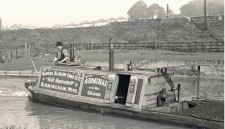
During the mid nineteenth century comes the beginning of understanding of the sources and causes of disease, and the steps taken to improve standards of hygiene and cleanliness. However, these steps were not taken for altruistic purposes, to improve the lot of the poor, but because early deaths reduced the available workforce.
One disease to which boatmen were particularly prone was cholera - unsurprising when you consider that their primary source of water for both drinking and washing was the canal itself. It is also apparent (though "skirted around" in the newspaper articles) that boatmen also used the canal as a handy sewer. There are a number of instances where drunken boatmen fell off their vessels when "doing the necessary" over the side of the boat!
The attached article, dated January 1849 is from the Leicester Chronicle, and details the steps being taken to improve sanitation in Leicester.
Erysipelas is a disease which I had not heard of before. It is a bacterial skin infection similar to cellulitis, and is also known as "St Anthony's Fire". The availability of antibiotics makes us forget that, back in the day, an infected wound could cause death. I confess though that a tale from Liverpool, where Edward Stock, a Pattern Maker, grazed his knuckles when beating his wife and died of the disease, seemed an appropriate justice.
Boatmen could also be at risk from the products they carried. In early March 1872, my Gx3 Grandfather, John Seymour, died in Stafford of suspected antimony poisoning. His cargo was scrap galvanised metal from Birmingham, and it was thought that chemicals used in the manufacture had caused his illness. John's wife Sarah and his mother in law Judith Harrison were also taken ill, but recovered. It seems likely that John and Sarah's youngest daughter Harriet was also a victim, as she was buried only six days before her father's death.
The boats themselves could create problems. Some were old and leaky, and occasionally a boat would sink, trapping the family in the cabin. Later boats brought other dangers. In February 1913, my Great uncle, Arthur Inman, was scalded to death whilst working on the Manchester Ship Canal when the steampipe of the "City of Liverpool" steamer burst, covering him with boiling water.

From a very young age, the children of boatmen and women learned what could be foraged from the hedgerows which was good to eat. But on occasions, the temptation to help themselves from the fields which they passed though was overwhelming, as these articles prove. I am sure there were many more cases when the boat had long gone before the theft was noticed!
On the whole, in an era where the poor drank to "drown their sorrows" and for some respite from their daily grind, boatmen were no better or worse than the rest. Some were prodigious drinkers, however! They probably had more excuse than most for spending their evenings in the pub with the entire family living in a small and confined boat cabin.

In many ways, canal boats were more vulnerable to petty thievery than houses were, although the evidence tends to suggest that boatmen by and large stole from other boatmen, perhaps not what might have been expected. Living on board meant carrying all your valuables with you, and even if the boat was locked up, it was always possible to break down the door and get into the cabin. Many cases involved crew members on the same boat helping themselves to each others belongings, and in some cases the theft took place when the victim was asleep in the cabin.
No website about canal boatmen would be complete without mentioning their role in fishing bodies out of the canal, which had come there either by accident or by design. Drowning oneself in the canal was a popular method of suicide. What I hadn't realised, however, was that in the early days, before mortuaries, bodies found in this way were taken to the local pub, where they would be displayed to see if anyone recognised the deceased, and where the inquest would later be held. If the body was in a particularly bad state, it would be placed in one of the outhouses, but by and large, the pub itself was used.
In choosing information for this section of the site, I have picked articles where the boatmen had some other role, rather than just the one of fishing the body from the canal.

Most boatmen treated their horses extremely well, as they accepted that, without them, they would not be able to earn a living. It was said that a boat horse would never go hungry, as its nose bag was regularly and plentifully supplied. But, sad to say, not all boatmen treated their boat horses with tender, loving care. Many boatmen were prosecuted for cruelty to their horses and donkeys, and the RSPCA often initiated these prosecutions.
I recall my my mum telling me the way in which boat families navigated through the canal tunnels. She said that they would lie on their backs in the boat, with their feet on the canal walls or roof, and using their feet, would push the boat through the tunnel. She also added that the boatman would lead the horse over the tunnel to the other end - thereby giving him the opportunity to snatch a pint at the hostelry there - whilst his wife and children pushed the boat through the tunnel. Pretty well everyone to whom I told this tale would look at me as though I was either simple minded or delusional!
She was right. The process is called "legging". On the longer tunnels, it was possible to hire the services of a "legger" who, for a small fee, would help the family "leg" the boat through the tunnel.
I can't recall where I "collected" the attached article from - it was a long time ago! - but would like to thank its author for its excellent descriptions not only of the tunnel itself but of the "legging" process.
At the end of the 19th century, the reformers in Victorian society were trying to improve the lot of the poor, and it was only a matter of time before the working conditions of canal boatman became the subject of reform. The idea of universal elementary education was not just to improve the lot of the poor, but to provide their employers with a more able workforce, something which was perceived as necessary to remain competitive in a changing world.
I think that the views of Smith and others on canal families can make for uncomfortable reading, but it should be borne in mind that in truth these reformers were judging boatmen against their own middle class morality, in which they felt secure in their own "rightness". Boatmen did not conform with these mores, and therefore their way of life was open to criticism because it was different. The reformers wished to put forward an image of the boatman as head of his household, and his wife and children as downtrodden accessories with few if any rights, but, as I have noted above, boating was one of only a few equal opportunity occupations, where women and men worked side by side as equals. Boatmen had their own rules, and their own ways, and these did not fit tidily with the Victorian middle class, who wished to "reform" the working classes in their own image.
The wish to improve the lot of the boatmen smacks of the nanny state at its worst. In the end the boat folk had no choice but to conform, whether they wanted to or not. This is not to say that the reformers didn't have a point. If all children in the UK were entitled to a free education, then why should boat and gypsy children be excluded? The crux of the matter was simple - if boating was better paid, then boat families could afford a house on land, rather than living on the boat. And of course, the opposition from employers to the reforms was on exactly those grounds - cost.
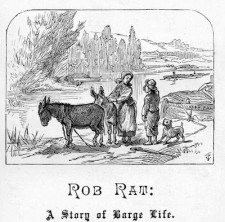
This may seem a strange title, but it concerns not literature per se, but literature as propaganda. The prime exemplar of this is probably "Uncle Tom's Cabin" by Harriet Beecher Stowe, which exposed the realities of slavery. But there were similar books written about boatmen and their families, morality tales in which the "good" were rewarded and the "bad" punished for their sins - drunkenness, immorality, criminality and breaking the Sabbath. Broadly, this could be referred to as "Sunday School literature" - the kind of books given out as prizes or awards to children who attended Sunday School regularly, and which contained not only a story to stimulate a child's imagination, but also a propaganda message for the parents who would read the book with their child. Two examples of this type of book which feature boat families are Rob Rat and The Old Lock Farm.
Reading the letters sent to the press by George Smith in his crusade to improve the lot of canal boatmen, one can see that many of them are written in the same style as these "Sunday School" books, a nugget of truth expressed and embroidered in a particular way to both fascinate and horrify the middle class audience.
For a more lengthy discussion of the way in which writings about boatpeople affected perceptions, Gill Foster's article can be found at www.rchs.org.uk/trial/3-2 Word power. pdf
For a precis of the book, Rob Rat, go to www.abalbert.blogspot.co.uk/2010/02/rob-rat.
In the case of "Rob Rat", the message for adults is contained in Chapter 2, "The Writer Buttonholes His Reader", the content of which is in no way appropriate for a child. A section of it is reproduced below.
History is history - it is what it is. And it must be reported without the airbrush and the saccharin. But this is not history, nor is it truth. It is propaganda, pure and simple, and pretty unpleasant propaganda at that.

A philanthropist and reformer, who singlehandedly changed the lives of canal boatmen.
George Smith was born in 1831 in Tunstall, Staffordshire, the son of William Smith, a brickmaker. At the age of 9, George started work in his father's trade, carrying about 40lbs weight of bricks or clay on his head, for thirteen hours a day. He managed to gain some education, and rose to become a manager at a brick and tile works. He never forgot his humble roots, and campaigned tirelessly for legislation on behalf of the brickmakers. In 1871, his efforts were rewarded by the passing of an act of parliament which provided for the inspection of brickyards and the regulation of juvenile and female labour there. His success did not endear him to some within the trade, and he lost his job at Coalville.
In 1873 Smith turned his attention to the conditions of life of the men, women and children living on canals and navigable rivers. In 1877, in consequence of his representations, the Canal Boats Bill was passed, which came into force on 1 January 1878. The act enforced the registration of all canal boats under the name of a place where there was a school for children to attend, as provided by the elementary education acts. It also regulated the sanitary conditions of life on board. However, the enforcement of the act was, at best, intermittent, and in many cases did not improve the quality of life of the boatmen at all. Finally, in 1884, a bill was passed to amend the 1878 Act and to make it more workable. It forced local authorities to make annual reports to the local government board, and the board to parliament. The local authorities were instructed to enforce the attendance of children at the schools, and an inspector of canal boats was appointed.
One of the major difficulties of implementing the Canal Boats Acts was persuading the boatmen to send their children to school, and for a long period the provision of education for boat children was intermittant, to say the least. Because the families moved from area to area, no education authority was able to take responsibility for the children, or summon the boatmen to court for the non attendance of their children.
However, as the following article from the Gloucester Citizen, dated 13 October 1883, shows, some local authorities and educators were considerably more enlightened than others. Birmingham, for example, provided a school and school places free of charge. By contrast, the managers at the St Nicholas schools in Gloucester made it abundantly clear that they would much prefer the children of boat families to be educated elsewhere.

Changes in the law in the 1870s and 1880s, as detailed above, forced boat families back into houses. The Canal Boats Act, and compulsory education for children made it impractical for families to continue to live on board. At this stage, many families gave up the boat life and took jobs in the burgeoning factories in the towns where they settled. For those families who remained working the canal boats, the wives and children could live in houses, while the men worked the boats. Nonetheless, many women still helped their husbands in the boat trade, leaving their older children, or other relatives, to look after the house and family while they were away. Sometimes there was no choice but to do this, in order to keep the money coming in.
My Great Grandfather, John Hinman, was working the fly or fast boats at the time of the 1881 census, and his wife and children were living in Runcorn, Cheshire. It is probably fortunate that living on board was no longer the "done thing" from John's point of view. He and his first wife, Tryphena nee Seymour, had eight children, and when Tryphena died relatively young, John remarried, to a widow named Eliza Lunt nee Webley. Eliza and her first husband, Edward Lunt, also a boatman, had five children, and Eliza and John then had another four together, making a grand total of 17 children.
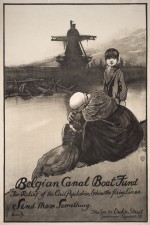
The First World War saw a resurgence in the importance of inland waterways for the carriage of goods. Some boatmen were exempted from military service, but the number called up created problems in keeping the system running smoothly. The truth was that skilled boatmen, with their knowledge of both the boats and canals, were more difficult to replace than expected. Finally, the skills which canal families had honed over generations were fully appreciated.

Thank you to Andrew Beechey for this fabulous photograph from November 1940, captioned :
The "horrible sight" at FMC's Fazeley Street depot on 1st November 1940 witnessed by Lily Flowers. The boats are FMC butty Kildare and motor Robin, carrying tubes to London from Coombeswood, and motor Rover and butty Grace, loaded with cocoa for Manchester. Violet and Dolly Beechey are standing on Robin's cabin, from which they miraculously escaped unhurt.
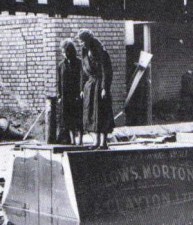
A close up from the photograph of Violet and Dolly, who had a very lucky escape. The Beecheys were a family who had worked on the canals for generations, so that Violet and Dolly were born to the boating life. But other girls and women were recruited to help keep the waterways running during wartime.
Everyone has heard of the Land Girls, who "dug for victory" during World War Two. But fewer have heard of the "Idle Women" who were the Land Girls of the Waterways. Idle Women because of the IW - Inland Waterways" badges they wore.
They were few in number - around 45 in total.

The Department of War Transport's only criteria for the Idle Women was that they should be "of robust constitution". And they needed to be. Eighteen hour days were not uncommon. There were three crew to handle two boats, one a butty boat.
Six weeks' training was provided, and after training the women were paid £3 a week for a three week round trip with a week's leave at the end of it.
The photograph above shows three of the Idle Women at Bull's Bridge, Evelyn Hunt, Audrey Harper and Anne Blake.
Evelyn Hunt kept a diary of her time as an Idle Woman, which is now available in print. An excerpt from it is reproduced here.
A group of women recreated one of the canal journeys taken by the Idle women, and there is an article on the Daily Telegraph Website which follows their journey.
Life became much more difficult for the working boatmen in the 1960s, when the use of canals for pleasure began. Some of the "tourists" thought it was acceptable to photograph working boatmen without their permission, or to peer through the boat windows at the family inside.
This article, by special correspondent W E Hall, has the following headline : "The boatmen who work the waters of the Midland canals are disgruntled, not because of trading conditions, but because of the curiosity of the public, which is indulged in at the expense of ordinary courtesy. Some people insist on taking photographs ; others just stand and stare".
Because this is recent, I have removed the names of the boatmen interviewed for this article.
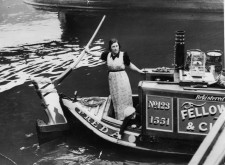
An article from the 70s, which records memories of a canal family. Again, names have not been included on this document, as it is so recent.

As well as all the usual petty crimes for which our ancestors have been taken to court, boatmen could be found guilty of a host of charges which were specific to their work.
According to the Worcester Chronicle of January 14th 1852, my GGGrandfather "John Seymour, a boatman, was fined 7s 6d and costs for wilfully damaging the top lock at Tipton, on the Birmingham Canal, on the 1st inst, by striking his boat against it. The offence was proved by Mr William Brooks, who estimated the damage at 5s. In default of paying the fine and costs, for which time was allowed, one month's imprisonment with hard labour. The maximum penalty for this offence is £5 or three month's hard labour."

Boatman worked in all weathers - rain and shine, snow and sleet, high winds and fog. The reason was quite simple - if they didn't work, they didn't get paid. There are cases here of boatmen who were blown off their boats in high winds, who fell into the locks because the fog was so thick, and at least one case where a boatman was struck by lightning.
There was one time, and one time only when the boatmen were unable to work, and that was when the canals were iced over and the boats unable to move. Most employers allowed the boatmen an advance on their wages when this occurred, otherwise there would have been no money coming in at all. The winter of 1871 was particularly severe, and here are a couple of articles from that winter, one comic and one tragic. But even the tragedy has its light and shade, in the kindness shown to a woman who, some might say, was deserving of none.
To quote from Henry Mayhew's 1851 book, "London Labour and the London Poor" (for which reference thanks to Joy Longdon), on the subject of marine store dealers:
"I find a difficulty in estimating the number of second hand metal ware street sellers. Many of the stalls or barrows are the property of the marine store shopkeepers (marine stores being about the only things which marine store men do not sell). The rag and bottle and the marine store shops are in many instances but different names for the same description of business. The chief distinction seems to be this : the marine store shopkeepers (proper) do not meddle with what is a very principal object of traffic with the rag and bottle man, the purchase of dripping, as well as of every kind of refuse in the way of fat or grease. The marine store man, too, is more miscellaneous in his wares than his contemporary of the rag and bottle store, as the former will purchase any of the smaller articles of household furniture, old tea caddies, knife-boxes, fire-irons, books, pictures, draughts and backgammon boards, bird-cages, Dutch clocks, cups and saucers, tools and brushes. The rag and bottle tradesman will readily purchase any of these things, to be disposed of as old metal or waste paper, but his brother tradesman buys them to be resold and re-used for the purposes for which they were originally manufactured."
I think everyone knows the story that the poor would take their Sunday best clothes down to "Uncle's" on a Monday morning, to be redeemed on the Saturday and worn again the following Sunday. But I hadn't realised that pawn tickets were a form of currency amongst the poor, and were bought and sold according to need. Many items which were pilfered by petty thieves went directly to the pawnbrokers, and the tickets were then sold on to innocent buyers (well semi-innocent anyway!). If you were lucky enough to find a pawn ticket, it was pennies from heaven, though occasionally the attempt to redeem them could have unforeseen consequences.
To quote again from "London Labour and the London Poor" by Henry Mayhew, "The Dolly system is peculiar to the rag and bottle man, as well as the marine store dealer. The name is derived from the black wooden doll, in white apparel, which generally hangs dangling over the door of the marine store shops, or of the "rag and bottles", but more frequently the last named. The dolly shops are essentially pawn shops, and pawn shops for the very poorest. There are many articles which the regular pawnbrokers decline to accept as pledges. Among these things are blankets, rugs, flock-beds, common pictures, "translated" boots, mended trowsers, kettles, saucepans, trays, etc. Such things are usually styled "lumber" A poor person driven to the necessity of raising a few pence, and unwilling to part finally with his lumber, goes to the dolly man, and for the merest trifle advanced, deposits one or other of the articles I have mentioned, or something similar. For an advance of 2d or 3d, a halfpenny a week is charged, but the charge is the same if the pledge be redeemed the same day".
An article from the Birmingham Post entitled "Truck among the Nailers - Important Evidence" includes the following statements: -
Statement from Mr John Price, a nailmaker, when asked the meaning of the phrase Petty fogger : -
"A master who compels his employee to buy the iron they require from him ; who keeps a truck shop, at which he also compels his men to purchase ; and who sells the nails made to masters, who in their turn sell them to the merchants"
From the same article, Mr Joseph Partridge states, "I am a nail maker, and work in Cemetery Lane, Halesowen. I work for Swindell and Co. They are money paying masters. I have worked for them nearly five years. I have worked for Mr Parrish ; he is not a ready money paying master. I have worked for Mr Parry and Mr Price. They are truck masters. When I was at Mr Parrish's, I received my iron on the Monday, and sometimes weighed in twice a week. I received a note with my wages on it, and I had to go into the tommy-shop with it. My wages were at that time 13s or 14s or 15s. I had to spend the greatest part at the shop. Mr Parrish has asked how many children I had, and then said, "You ought to spend more money; if you don't spend more, you cannot have work". He has gone into the shop to see what we got. I believe the notes have been done away with twelve months, but he still keeps the shop. The quality of the articles I got was very inferior. I have had flour which was not fit for a pig to eat. It was 8d dearer to what we could get it anywhere else. I got sugar, tea, bacon and other things there. There are I believe twelve foggers near me. I cannot tell how many men they have got under them. They all keep shops, and the men are expected to go there. I was expected to go to the shop. If I had not gone, I should have had no work".
The tommy-shops operated on a truck system where tokens of some sort are given in lieu of wages, which limits the choice of employees' as to where to spend their money, and also permits employers to charge a premium on goods, as there is no competition. The quality of the food was so poor in many cases that the system added a new word to the English language - "Tommy-rot".
Some of the ironmasters in and around the Midlands operated a truck system for their employees, as detailed above. And these same ironmasters employed boatman to move their products, and they too were sometimes paid in truck, not cash. I felt like cheering when I read the attached articles.
My mother might have been a God-fearing woman, but she was also extremely superstitious. When I have mentioned this to others with canal boat ancestors, it has struck a chord with all of them. If you have any examples in your own family tree, I would love to hear about them.
Thank you to Jeanette, who told me that her gran, on being given their school photographs, would put them in a closed box, face down, so that the children's souls wouldn't leach away!
Two of my mother's superstitions I can recall from my childhood (apart from the standard stuff, like not crossing on the stairs, or leaving your knife and fork crossed on the plate!). She would not have hawthorn in the house. As a kid, I remember picking some as part of a bunch of wild flowers, and she would not let me in the house until I had put the hawthorn in the bin. Another was that eggshells had to be broken before they were thrown away - something I do to this day. If the eggshells were not broken. then the witches would use them as boats to carry the souls of drowned men to hell.
I found one example in my archive of boatmen being superstitious, and I am sure there will be more before I am done.

At this point, I feel rather like the large and luscious lady who used to appear at the end of "The Morecambe and Wise Show" and announce, "I'd like to thank you for watching me and my little show tonight.....So. Good Night, and I love you all!" If you have found the information on here useful, or interesting, please let me know. If anyone has information or memories they would like me to include, then please get in touch, and I'll add them if I can. And if there are any glaring gaps in the information, then please let me know too. As I said at the outset, I am not pretending to be an expert in these matters, just someone who is interested in her boatmen ancestors, and who felt there was not a great deal of information available online about boatmen and their way of life. It would be a shame if these things were forgot.
There is a further selection of articles about canal boatmen and their lives on the next page. I have tried to choose ones from different areas, and ones which detail major events, as the level of detail in these is very informative, Choose Boatmen in the News.
